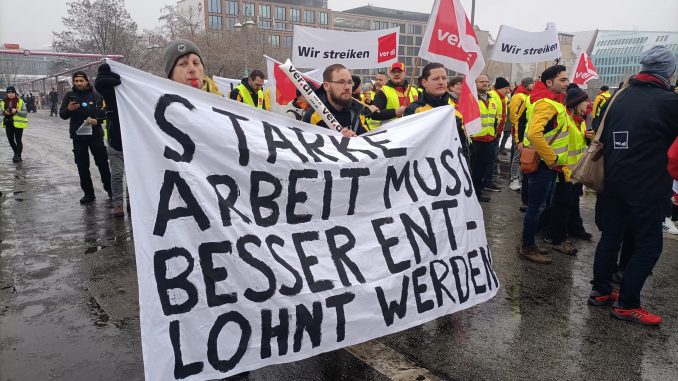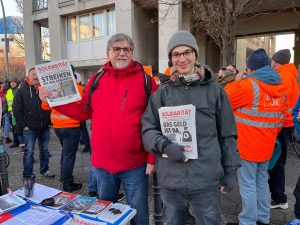
The cost of living crisis has led to an increase in protests and workers’ strikes in a number of countries, most notably in the UK and France. Now Germany could join the ‘strike countries’.
After almost 100,000 postal workers out of a workforce of 160,000 took ‘warning strike’ action (limited strikes of one working shift or a full day traditionally organised during collective bargaining negotiations to put pressures on the employers) in recent weeks, the third round of negotiations between the Deutsche Post management and the ver.di trade union failed, and the trade union is preparing a ballot to organise an unlimited strike.
Ver.di demands a 15 percent pay rise for this year in a company which is marked by low pay jobs and whose workers have gone through real wage losses over the last years – while the company made a record profit of over eight billion euros, last year. The management’s offer – a lump sum for 2023 and a meagre increase only in 2024 – was more like a provocation. One postal worker said: “I was sceptical first if we should go on strike but after this we have to.”
Postal workers are the first of several big workforces who are or will be in collective bargaining negotiations. The pressure from the rank and file led the trade unions to put forward relatively high demands – which made a compromise before a ballot more difficult than in previous negotiations. The public sector workers at local councils and at the federal state level, have also begun negotiations and their first warning strikes took place. They demand 10.5 percent but a minimum rise of 500 Euro – which for most workers with median wages means around 15 percent and for the low paid up to 20 percent.
One of the two railway trade unions (EVG) will also start its wage round in March and recently even published the demand of 12 percent and a minimum rise of 650 euros. This shows how pressure from below has built up over the recent months and the trade union leaderships had to react to that. Anger amongst many workers is fuelled by the fact that the government has agreed on a special fund of 100 billion euro for the German military but says there is not enough money for better wages. It is remarkable that the EVG is putting forward such a high demand as it has a tradition of far reaching ‘co-management’. This led to a layer of workers leaving EVG for the historically more moderate but, in recent years, more combative train drivers’ union, GDL, which will start its own collective bargaining negotiations in autumn.
Inflation
The background to these developments is the high inflation rate of 7.9 percent over the year, and of 8.7 percent, in January 2023, compared to January 2022. However it has to be emphasised that the real increase in the cost of living for working class people is much higher, as basic goods like food, energy etc. have gone up much more in price. That means that even the comparably high demands of the trade unions in this year’s collective bargaining negotiations would, at best, prevent a further loss in real wages for many workers even if they would be fully implemented. Knowing this, the mood amongst workers is clearly there for a struggle to get as much out of the wage rounds as possible.
But it is not only the question of wages which workers feel the need for change with. Especially in the public sector, the post, railways and other parts of the service sector, there is a shortage of labour which increases the pressure of work enormously. Those who were praised as “heroes” during the pandemic now have to realise that the government and employers have nothing to offer to them.
Hospital workers, in particular, have been waging a struggle for more staff in hospitals for a number of years and have in a number of hospitals successfully won “health safety contracts” which have the aim of leading to more staff being employed. These struggles also put a lot of pressure on the government to change the system of hospital funding, away from the notorious ‘diagnosis related groups’ (DRGs) financing system, which put hospitals under pressure to reduce costs. The new social democratic-green-liberal three-party national coalition and its health minister, Karl Lauterbach, now claim to “have understood” and to abolish the DRGs. In reality, their hospital reform is an eyewash, which will not abolish the DRGs but just re-organise them, and includes a plan for the closure of many hospitals or parts of hospitals!
In some areas, hospital workers now belong to the most combative workforces in the public sector and play an important role in the present warning strikes, which began last week. In Berlin, for example, on February 9th, a joint warning strike took place of public sector workers. This involved hospital workers, refuse workers, and waterworks and university workers, with thousands marching through the capital in a show of working class strength.


Radical speeches
Some trade union leaders give radical speeches reflecting the pressure from below. The vice-chairwoman of ver.di, Andrea Kocsis, spoke at a rally of postal workers in Berlin, and threatened the employers with a joint strike movement of postal, public sector and railway workers. This is exactly what is needed and what members of Sol (CWI Germany) have been arguing for over the last weeks and months within the trade unions.
While the government and the leadership of the trade unions prevented a “hot autumn” of protests against the price hike, it seems possible now that a storm is brewing in the workplaces.
A broader protest movement did not develop in autumn despite attempts by left wing organisations and individual trade union activists to call for demonstrations. This was because, on the one hand, the government made a number of concessions in regard to one-off payments for the poorest layers in society, a (limited) price cap for gas and electricity, the introduction of a cheap ticket for regional public transport of nine euros per month for three months, last summer, and the announcement that it will introduce a 49-Euro-ticket from this spring onwards. On the other side, the trade union tops did not seriously mobilise for broader protests. On the contrary, in the metal workers’ collective bargaining round in autumn, they agreed to a bad compromise and participated in the government’s “concerted action” – a round table of government, employers and trade union leaders to work together for “social peace”. The DGB (German trade union congress) chairwoman Yasmin Fahimi, a former SPD general secretary, even criticised the government for not giving subsidies to corporations which paid out high dividends to their shareholders. She said: “This is not the time for criticism against capitalism.”!
Sol members in the trade unions argue for a fighting strategy to win the full demands, and explain that this will not be possible by a series of limited warning strikes but that strike ballots and unlimited strikes will be necessary. We argue for coordinated strike action of all workers who are in collective bargaining rounds, and for a broad solidarity campaign by all trade unions, the Left Party and social movements. This should also put forward the demand of a sliding scale of wages, pensions and social benefits. We argue for democratic decision-making during the strikes, through daily meetings of the strikers, the election of strike committees and delegates to regional and national strike conferences. And we warn that combative speeches of trade union leaders are not enough and, as experience shows, should not be trusted. A coming together of militant trade union activists is necessary to develop a programmatic alternative to the policy of the trade union bureaucracy. Together with other activists, we have founded the ‘Network for Fighting Trade Unions’ (VKG) which intervenes in all the strikes with leaflets and proposals.
It is open how the next weeks and months will unfold and if Germany will see the biggest clash between the classes for many years or if the employers and trade union leaderships find a compromise to avoid that. This could mean to throw dust in the eyes of workers by, for example, agreeing on a two-year-contract – which would, in reality, mean a low wage increase as the demands by workers are meant for one year.
The ballot for unlimited strike for postal workers, the high participation in the public sector, as well as some other smaller strikes, show the combative mood. This year could mark the beginning of a new quality of class struggle in Germany. It shows the necessity not only to fight for democratic and fighting trade unions but also for a mass socialist alternative to the capitalist system. This is the root cause of the economic crisis and inflation, and poor wages and working conditions for millions, while the millionaires and billionaires get richer.
